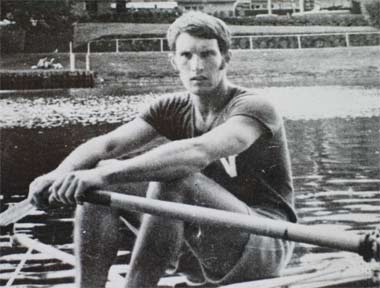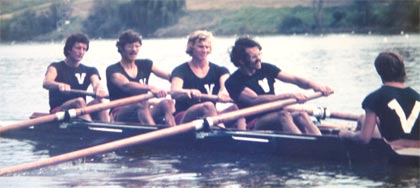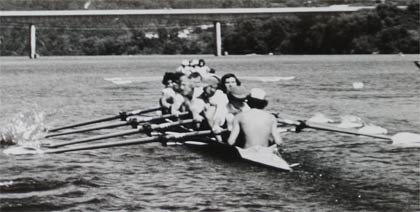History of Mercantile Rowing Club
Table of Contents
Chapters
- The River Yarra
- Early Rowing in Victoria
- The Beginnings (1880-1890)
- Mercantile in the Nineties (1890-1900)
- Sloan, Ivens and Fluctuating Fortunes (1900-1910)
- Dark Days and New Dawn (1910-1920)
- Years of Mixed Success (1920-1930)
- Through the Thirties (1930-1939)
- The Struggle for Survival (1939-1946)
- Building for Success (1946-1950)
- Mercantile to the Melbourne Olympics (1950-1956)
- Rowing to Rome (1956-1960)
- A Pink Cloud on the Horizon (1960-1965)
- The Storm and its Passing (1965-1966)
- A Clear Light Blue Sky (1966-1968)
- High Noon (1968-1970)
- A New Challenge (1970-1973)
- Fire and the Second Building Project (1973)
- Winds of Change (1973-1976)
- The Close of the Century (1976-1980)
- The Base for Success (1980-1984)
- Success (1984-1988)
- Oarsome Foursome (1988-1992)
- A Boathouse for the Best (1992-1996)
- The Rise of the Professional Coach (1996-2000)
- Golden Girls (2000-2005)
Appendices
19. Winds of Change (1973-76)
Chapter Nineteen page 1 2
During the 1974-75 season, senior rowing in Victoria was seriously disrupted by the premature selection in September, 1974, of a State squad for training for the King's Cup race in April, 1975. This resulted in a number of clubs being deprived of their senior oarsmen and the V.R.A. permitting the boating of composite crews contrary to its rules. The experiment proved unsuccessful and Victoria finished a disappointing third to New South Wales and South Australia in the King's Cup.
The experiment also proved to be disastrous in other ways for both Mercantile and the State of Victoria. For Mercantile it meant that our surviving senior oarsmen following the retirements of the previous two seasons were unavailable to help reform a new senior eight and for Victoria, it contributed to a decline of competitive senior rowing in the State. In addition to the premature selection of the King's Cup squad, there was also a Victorian Colts (under 23 years of age) crew selected in October, 1974, which had the combined effect of eliminating all senior competition in Victoria prior to Christmas. The lack of competitive rowing at this level was to haunt Mercantile and Victoria for several seasons.
The Victorian Colts crew that toured New Zealand in December, 1974, under coach Phil Cayzer, contained club members Stephen Shirrefs, Alex Sloan and Stephen Webster, together with the young Melbourne Grammar School oarsman Andrew Withers, who was rapidly to become prominent in Mercantile, Victorian and Australian rowing.
The Victorian King's Cup squad under coach Paul Guest, ultimately contained two Mercantilians, Bruno Romanin and Andrew Withers.
Success in the senior ranks of Mercantile was left largely in the hands of the club scullers Peter Benjamin and Ken Leach. Peter was selected as Victoria's representative in the 1975 President's Cup.

Ken Leach
However, the lightweight eight under Martin Tomanovits and the junior eight under Phil Cayzer both continued their successes in their respective Victorian and National Championships. The lightweight eight was again instrumental in the club winning the Lightweight Premiership and had three new faces from the previous season, Bob Richardson, Tim Ling (coxswain) and Richard Garrard, who was to cap off a successful senior rowing career by beginning an equally successful career in the lightweight ranks. The junior eight saw only the introduction of Mike Manley.
In a very determined attempt to gain international selection, the lightweight eight also won the South Australian and New South Wales lightweight eight Championships, and was narrowly defeated by a canvas in the final stages of the South Australian Champion Eights. Despite the crew being unbeaten in its class and having a most impressive record in senior racing, it failed to gain selection to represent Australia. After a tied postal vote between the state rowing associations the President of the Australian Rowing Council exercised an unfavourable casting vote against the selection.
Also successful was a maiden eight which was formed late in the season under coach Hubert Frederico, and which contained three future international oarsmen, Phil Ainsworth, Ian Porter and Tim Young. This crew concluded the season by entering in the National Junior Eight Championship, finishing second to the club's junior eight.
At the end of the season, the club appointed several senior members to form a sub-committee to make recommendations to the committee in respect of the club's attitude to senior rowing in the coming season. A paragraph from their report aptly describes the feeling at the time: "The sub-committee was firmly of the opinion that the future and long term success of Victorian representation in National rowing and, in turn, Australian representation in international rowing, must continue to be based on strong senior competition between clubs. We also take the view that a prerequisite to this is a return to an emphasis of club rather than composite competition in State Championships and other qualifying events, together with an extension of the time available for club competition and, in particular, senior eight races prior to the selection of state crews."
The report made specific recommendations for all levels of rowing as it affected Mercantile. Among the recommendations at the club level were:
"(a) It is considered that regardless of V.R.A. policy the club should discourage its oarsmen from participating in a State squad, if held either prior to the commencement of the regatta season, or during a regatta season prior to the Champion Eights.
(b) The club should also discourage its oarsmen from participating in Colts competition unless this is on the basis of club crews.
(c) That regardless of V.R.A. policy in relation to composite crews, the club should continue to boat crews in its own right in all classes of competition."
These recommendations formed the basis of club policy, although in future years, club and State policies were not so clearly in conflict.
Despite a strong administration during that season, there were many changes on the committee. In particular, the elected captain, John Gumley, due to changed circumstances, resigned, as he was unable to devote the necessary time to the task. The vice-captain, Martin Owen, led the club until the appointment in December of John Harry as captain.
This unsettled administration of the club had become all too prevalent in the preceding seasons, and the club committee in April, 1975, appointed another sub-committee to report on the administrative structure of the club and possible administrative changes. Included in their proposals for discussion in the May committee meeting of the year was the following: "The main concern of the group is that the job of the captain of Mercantile is in practice too large for one person. It is felt that consequently recent captains have either unnecessarily disrupted their work or family responsibilities, or settled for less than perfect administration."
The sub-committee was of the opinion that over the preceding four to five years there had been an absence of recently retired oarsmen who were willing to undertake onerous administrative responsibilities.
The club committee considered the report and submitted proposed constitutional changes to the club at the June, 1975, annual general meeting which were adopted. The constitutional changes made possible the election of members to positions which entailed accepting responsibility for a specific area that had been previously been part of the captain's duties. In particular the new position of chairman of selectors now entailed responsibility for all rowing, and so the role of the captain became one of supervisor and not of routine.
Much debate centred upon whether the title of captain should be retained. The committee at first instance was unable to decide whether a new title was necessary, and it eventually called a special committee meeting to decide the matter. Finally the committee considered that the title of captain should be replaced temporarily by the words "executive chairman", as this more truly conveyed the changed responsibilities of that office. Until the title reverted back to "captain" in 1979, many members refused to accept this break with tradition and persisted with the old terminology.
The 1975-76 season saw the consolidation of Mercantile's position as the dominant club in Australian lightweight rowing. Martin Tomanovits, the club's first executive chairman, coached a lightweight four of John Hawkins (bow), Peter Macartney (2), Ian Porter (3), Terry Thurtell (stroke) and Victor Ronai (coxswain) to considerable success that year. The crew won the Australian coxed and coxless lightweight four Championships, the Victorian lightweight and junior four Championships together with thirteen other regatta races, retaining an unbeaten record in their class during that season. Considering the policy of the Australian selectors before that year, and also the particularly high standard of the crew, Martin Tomanovits was again unlucky not to coach a Mercantile based Australian lightweight crew.

1976 Interstate Champion Lightweight Four
Bow: John Hawkins, 2: Peter Macartney, 3: Ian Porter, Str: Terry Thurtell, Cox: Victor Ronai-Horvath, Coach: Martin Tomanovits
The lightweight eight under coach David Palfreyman contained three new faces, Mark Connolly, Clem Koster and Martin Aitken (coxswain). The crew retained the Victorian, New South Wales, South Australian and National Lightweight Eight Championships with another season of complete success in its class. Mercantile again won the lightweight premiership in a most convincing manner.

1976 Australian Champion Lightweight Eight
Bow: Andrew Guerin, 2: Mark Connolly, 3: Ian Duthie, 4: Martin Owen, 5: Tony Spriggins, 6: Richard Garrard, 7: Clem Koster, Str: Glenn Robertson-Smith, Cox: Martin Aitken, Coach: David Palfreyman
The senior ranks saw the selection of Andrew Withers and Tim Young in the King's Cup crew, and the introduction of three entries from each State in the President's Cup enabled two club scullers Peter Benjamin and Ken Leach to represent Victoria in this event. The club began the task of reforming a strong senior eight in this season, but the young crew did not achieve the desired success.
The immediate period following the fire had resulted in the club's emphasis in time and money being directed toward re-building a clubhouse rather than on rowing or equipment. Despite this handicap, the club purchased its first specialised lightweight boat in 1975 and had considerable success throughout the season. The club's lightweight oarsmen also donated a set of 10 lightweight blades.
The inflationary period of the early seventies had led to a dramatic rise in the cost of all equipment. The cost of new racing eight had reached the $5,000 barrier, with the cost of an oar exceeding $100. Mercantile decided to purchase all its equipment from Australian boat builders, whose products were now comparable to the high standards of European manufacturers.
These increasing costs forced the club to increase the subscription levels in April, 1976, to the following levels:
| Senior Active | $30.00 |
| Senior | $25.00 |
| Junior | $20.00 |
| Country | $10.00 |
| Associate | $20.00 |
It was also in this season that the clubhouse was beginning to be more fully utilized. The sauna, which was now in operation, complemented the gymnasium which had been largely built up by Ted Sorani. The bar, which was now opened on Thursday evening as well as the normal Sunday mornings, was covered with carpet tiles donated by regular patrons; and a wooden bar top was installed, made from a major cross beam of the old shed prior to the fire.
